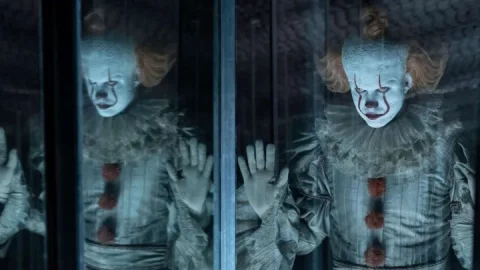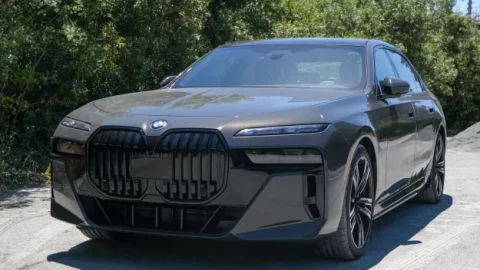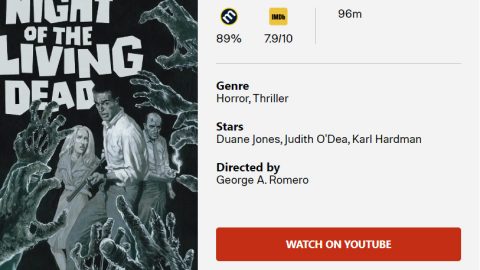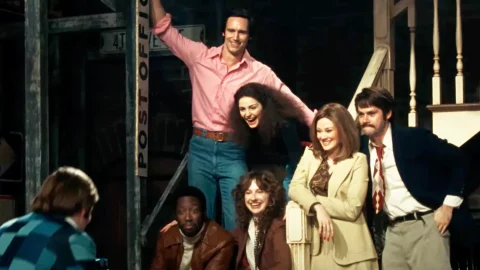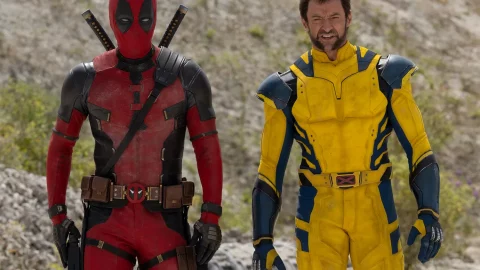Owen Teague stars as a wide-eyed chimp named Noa in the latest installment of the long-running franchise.
Though not present in Kingdom of the Planet of the Apes, Andy Serkis’ Caesar leaves a lasting impression. Serkis’s chimpanzee protagonist, who learned to speak and led his brethren to victory against warring humans, has been the franchise’s heart and simian soul since his 2011 film debut, Rise of the Planet of the Apes. Wes Ball’s Kingdom of the Planet of the Apes, the fourth film in the reboot series, opens in theaters on May 10 and takes place several centuries after Caesar has been laid to rest. However, as a new protagonist emerges to follow in his (prehensile) footsteps, his lessons remain relevant.
Kingdom of the Planet of the Apes, which is set roughly 300 years after Caesar’s death, introduces a new hero in the form of young chimpanzee Noa (Owen Teague), who lives in the post-apocalyptic wilderness with his family. The apes in their small village, led by Koro (played by Neil Sandilands), have taken up farming and falconry. (Watching Noa swing fearlessly above the treetops in search of an eagle egg that he will raise and train from birth serves as our first introduction to Noa.) Soon, however, a gang of mask-wearing apes—tall gorillas and chimps on horseback—attack Noa’s peaceful clan and kidnaps the villagers. Noa has to save his friends and family from this group of invading simians.
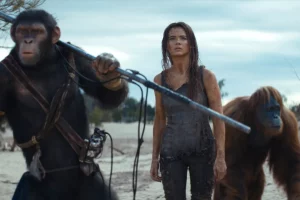
Noa (Owen Teague) and Nova (Freya Allan) in ‘Kingdom of the Planet of the Apes’. 20th Century Studios
Most apes by Noa’s time either worship Caesar or have completely forgotten the gregarious chimp; Noa is firmly in the latter camp. He meets Raka (Peter Macon), a solitary and wise orangutan, while lost in the wilderness. Raka educates him about the principles of Caesar, including peace, justice, and a contempt for ape-to-ape violence. Noa embarks on a treacherous quest to rejoin his clan, crossing overgrown airports, abandoned observatories, and crumbling cities in the wilds with Raka acting as his Orangu-Wan Kenobi.
Along the way, he encounters an enigmatic human (Freya Allen from The Witcher), whom Raka and Noa refer to as “Nova” in homage to the numerous female characters of the same name in the series. Noa quickly learns that this wild child might be concealing secrets of her own, despite the fact that she seems to be like most humans of her era: savage, silent, and incapable of sophisticated thought.
On their journey, they arrive at the coastal combat base of Kevin Durand’s (Kevin Durand), an aspirational hobgoblin who has declared himself to be Caesar’s unofficial heir. He is the kind of smirky dictator who tells his people that every day is a “wonderful day.” William H. Macy plays a sulky human who plays his guide and tries to con him with stories about the glory days of Rome. Proximus’ soldiers have already taken control of this region of the nation by using electricity to make improvised cattle prods. Next, they intend to use their power to permanently exterminate those bothersome humans.
Similar to its predecessors, Kingdom explores complex concepts regarding the nature of humans and apes, particularly after the young Noa experiences the violence and ambition of Proximus Caesar’s prison camp. But where previous films tackled thorny issues of prejudice and power, Kingdom remains a bit more removed: The movie toy with ideas like fascism, authoritarianism, and how shrewd leaders can rewrite history to suit their own interests, but it never really goes into detail on any of these topics. The third act of Kingdom, which has a nearly two-and-a-half-hour runtime, drags particularly inexplicably.
The opening sequences of Noa’s trek through the wilderness are far more effective: Whether he is fearlessly scaling cliffs to retrieve an eagle egg or reluctantly sharing meals with Nova over a campfire, Teague’s wide-eyed chimp makes for a compelling hero. Ball depicts his lush, post-apocalyptic jungle in breathtaking detail, and Kingdom is an exciting pure ape-versus-wild survival story. (The director is directing The Legend of Zelda next, and while you watch Noa wandering through the woods, you can easily picture Ball bringing the same attention to detail and sense of wonder to his big-screen Hyrule.)
Above all, Kingdom just looks stunning. Heartfelt motion-capture performances enhance the meticulous detail that goes into each ape’s portrayal. (Teague is particularly outstanding as the valiant Noa, alternating in an instant between intense human feeling and animalistic fury.) The sincerity with which Kingdom follows Noa on a genuine hero’s journey is refreshing in a summer movie landscape bereft of cynical reboots and cheesy superhero sequels. Noa is a more than worthy successor to Caesar, despite his passing. Grade: B
by EW

